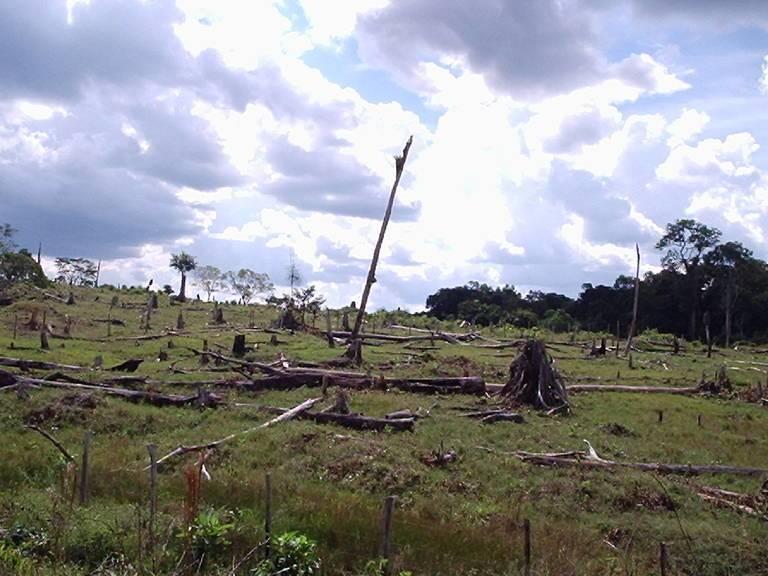
Earlier this month, Brazil's immensely popular supermodel Gisele Bündchen managed to do something that environmental and human rights organizations have been trying to accomplish for months: With a single tweet, she got Brazil President Michel Temer to promise he would drop his support for legislation that would have removed protections from the country's Amazon preserves.
It's a move that may seem small in the scope of global ecological woes, but since Temer took office in 2016, the government's efforts to stop the deforestation of its Amazon Rainforest has taken a dramatic back slide. Many critics credit that failure to Temer's affiliation with the country's agribusiness lobby and his lukewarm attitude toward environmental protections. The bill that Temer was expected to have signed (and which he himself proposed) would have opened up tracks of land to agricultural businesses that, according to Mongabay, supported Temer's rise to power after former president Dilma Rousseff was impeached last year.
Brazil outsourcing of Amazon monitoring
But Temer's veto of his own legislation may only be a temporary stay on the fight to open up more Amazon Forest to developers. In May, shortly before the legislation was expected to pass, the government announced that it would now be outsourcing deforestation monitoring. Since the 1980s, that task has been overseen by the National Institute of Space Research, which as we have written before, has played a key role in protecting Brazil's environmental legacy through remote sensing technology. It has also helped the government to enforce anti-deforestation policies.
The recent firing of a key scientist and the announcement that the government has other plans for deforestation monitoring is sending a worrisome signal to environmentalists and to countries that feel the Amazon's health will directly affect the world's future climate.
So on Thursday, the government of Norway delivered its own public mega-punch. It warned the Temer government that if it doesn't reverse its current track record in deforestation, Norway will cut off the incentive funding it has been providing to the cash-strapped country.
Since 2008, Brazil has been receiving $1.1 billion funding from the small Scandinavian country in return for reducing Amazon deforestation. In Norway's view, preserving the Amazon is a global investment. In Brazil's view, it's cash that is vital (especially right now) to its economic well being.
And apparently, the funding has been helping. According to Vidar Helgesen, Norway's environment minister, the rate of deforestation plummeted between 2008 and 2014 -- only to skyrocket in 2016, when some 3,000 square miles of rainforest was slashed for commercial purposes.
Brazil's economic crisis and the U.S.
Temer's administration is eager to bring economic stability to the country, which has been in the throes of political and economic crisis for several months. In May, Brazilian stocks took a nosedive after news was released that Temer may have sanctioned paying off a witness who was expected to testify in a massive graft probe.
That, in turn, has raised fears that major companies that have a vested interest in Brazil's agribusiness empire could be affected if the country's economic problems continue. Among the U.S. corporations that could be affected are Monsanto and Mosaic, major potash and phosphate mining company.
Goldman Sachs says Mosiac has a sales exposure of 26 percent in the Brazilian economy. Potash is used globally by small and large agricultural growers. Further economic problems could spell problems for companies that have large investments in Brazil.
And it could also spell problems for meat distributors as well. The same day that Brazil was handed its "desist deforestation" notice by Norway, the U.S. suspended imports of Brazilian beef, accusing Brazil's food inspectors of taking bribes. U.S. meat inspectors say they have turned away more than 10 percent of the imported meat they've checked from Brazil, a significantly larger amount than is normally rejected. Other countries have also suspended meat imports.
These problems, combined with the increasing global concern about the deforestation of the Amazon may spell demise for the Temer government, which is already on rocky ground with voters. Here in the U.S., it will be interesting to see how that plays out with fast food companies like Burger King that have relied on Brazil's beef production and have been accused of taking a direct role in the deforestation of the forest that scientists call the lungs of the planet Earth.
Flickr image:Daniele Gidsicki
Jan Lee is a former news editor and award-winning editorial writer whose non-fiction and fiction have been published in the U.S., Canada, Mexico, the U.K. and Australia. Her articles and posts can be found on TriplePundit, JustMeans, and her blog, The Multicultural Jew, as well as other publications. She currently splits her residence between the city of Vancouver, British Columbia and the rural farmlands of Idaho.














